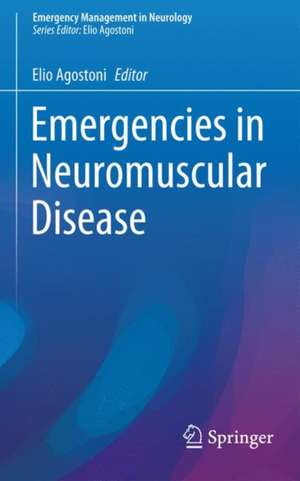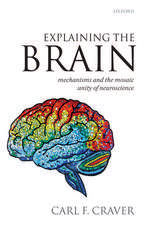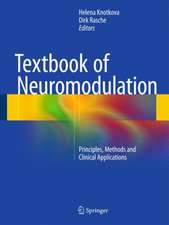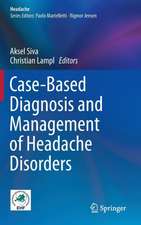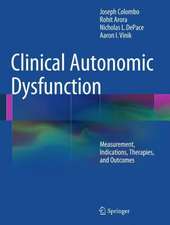Emergencies in Neuromuscular Disease: Emergency Management in Neurology
Editat de Elio Agostonien Limba Engleză Paperback – 17 oct 2017
Preț: 247.36 lei
Preț vechi: 260.38 lei
-5% Nou
Puncte Express: 371
Preț estimativ în valută:
47.35€ • 51.45$ • 39.80£
47.35€ • 51.45$ • 39.80£
Carte disponibilă
Livrare economică 31 martie-14 aprilie
Preluare comenzi: 021 569.72.76
Specificații
ISBN-13: 9783319566535
ISBN-10: 3319566539
Pagini: 103
Ilustrații: XV, 134 p. 5 illus., 3 illus. in color.
Dimensiuni: 127 x 203 x 6 mm
Greutate: 0.19 kg
Ediția:1st ed. 2017
Editura: Springer International Publishing
Colecția Springer
Seria Emergency Management in Neurology
Locul publicării:Cham, Switzerland
ISBN-10: 3319566539
Pagini: 103
Ilustrații: XV, 134 p. 5 illus., 3 illus. in color.
Dimensiuni: 127 x 203 x 6 mm
Greutate: 0.19 kg
Ediția:1st ed. 2017
Editura: Springer International Publishing
Colecția Springer
Seria Emergency Management in Neurology
Locul publicării:Cham, Switzerland
Cuprins
Preface.- Glossary.- Part I. Neuromuscular Disease: Recent Progress in Diagnosis and Therapy.- Neuromuscular Disease: An Overview.- Tetanus.- Guillain-Barré Syndrome.- Porphyria.- Vasculitis.- Myasthenia Gravis.- Botulism.- Malignant Hyperthermia.- Rhabdomyolysis.- Periodic Paralysis.-Part II. Case Studies.- Case Study: Atypical GBS.- Part III. Differentiated Decisional Algorithms.- Differentiated Decisional Algorithms Based on the Technical and Organizational Characteristics of the Hospital Receiving the Clinical Case.
Notă biografică
Prof. Elio Agostoni – Editor of the Emergency Management in Neurology series – is the Director of the Department of Neuroscience and Chairman of the Neurology-Stroke Unit at ASST Grande Ospedale Metropolitano Niguarda, Milan. His academic pursuits are based at the Neurology Post Degree School, University of Milan-Bicocca, and he is a coordinator and professor for the II level master’s degree in Cerebrovascular Diseases at the University of Milan-Bicocca, and in Emergency Neurology at the University of Pavia. He is also the scientific director of several regional, national and international research projects.
Prof. Agostoni is vice president of Italian Society of Neurology. Prof. Agostoni is a member of several societies and the regional SNO coordinator (Italian Scientific Society of Neurologists, Neurosurgeons and Neuroradiologists) – Lombardy Region, coordinator of the Italian Scientific Association - Stroke Organization (ISO), coordinator of the Cerebrovascular Committee andNeurological Sub-Committee for the Lombardy Region and coordinator of the Lombardy Region working group for Stroke Unit Accreditation. He is also a reviewer for a number of international scientific publications and is the author of over 400 scientific articles in respected international journals.
Prof. Agostoni is vice president of Italian Society of Neurology. Prof. Agostoni is a member of several societies and the regional SNO coordinator (Italian Scientific Society of Neurologists, Neurosurgeons and Neuroradiologists) – Lombardy Region, coordinator of the Italian Scientific Association - Stroke Organization (ISO), coordinator of the Cerebrovascular Committee andNeurological Sub-Committee for the Lombardy Region and coordinator of the Lombardy Region working group for Stroke Unit Accreditation. He is also a reviewer for a number of international scientific publications and is the author of over 400 scientific articles in respected international journals.
Textul de pe ultima copertă
This book offers a practical tool for handling neuromuscular emergencies, and is divided by the main neuromuscular diseases on the basis of their anatomical and clinical location: diseases affecting the anterior horn of the spinal cord (tetanus), those that affect the nerve roots and nerves (SGB, multiple mononeuritis, porphyria), the neuromuscular junction (MG and botulism) and, lastly, muscle pathologies (rhabdomyolysis, malignant hyperthermia, periodic paralysis). It provides updated diagnostic/therapeutic protocols and decision-making algorithms for each pathology, and examines a range of scenarios on the basis of clinical cases. Emergencies in Neuromuscular Disease will be of interests for a wide variety of specialists including neurologist, neurophysiologists and anesthesiologists.
Caracteristici
Provides decision-making algorithms for the level of care according to the clinical need and logistical aspects of the hospital organization and available resources Pursues a practical approach based on the clinical and neurophysiological evaluation of emergency neuromuscular diseases Highlights clinical cases that cover a range of different neuromuscular emergencies
